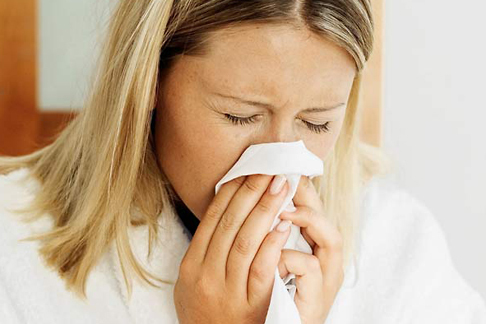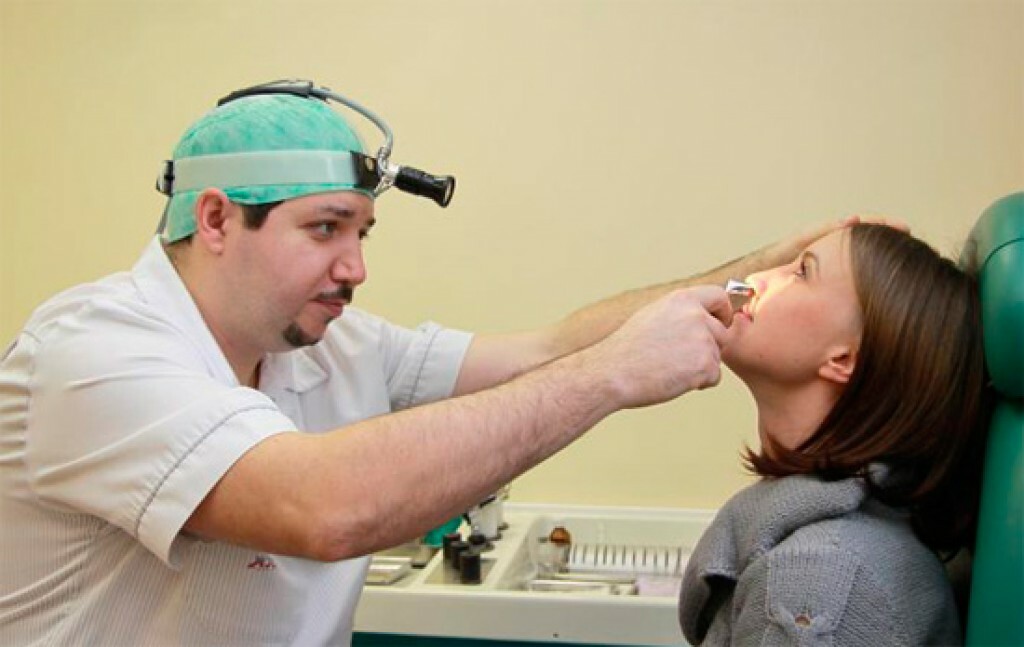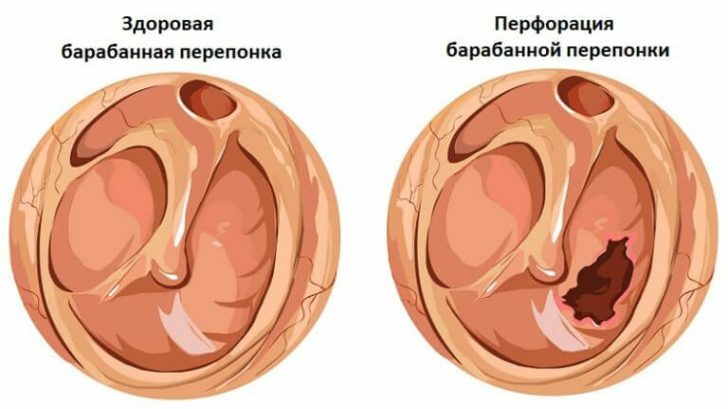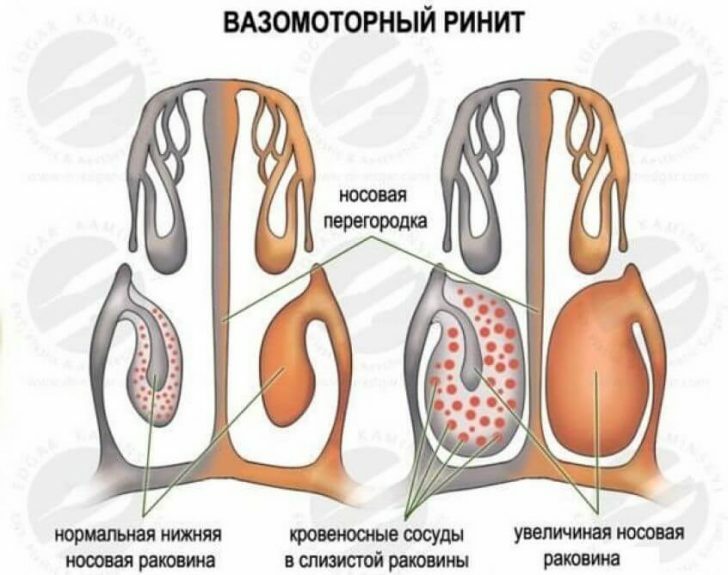Runny nose in the morning: the causes and ways to get rid of it

Many people are faced with the fact that in the morning, immediately after awakening, they have a runny nose.Moreover, this phenomenon is the morning phenomenon - during the day the person's breathing is absolutely free, he does not feel any discomfort, and in general there are no symptoms of malaise.
Unlike colds and / or allergic rhinitis, the condition in question is not as harmless as it may seem.Runny nose in the morning can indicate the development of severe pathology, so you need to know everything about this phenomenon in order to prevent possible complications.
Table of Contents: Causes of Morning Cold Symptoms of a common cold in the morningsCauses of morning cold
The doctors have studied the phenomenon quite well, so it is easy to distinguish its causes.
A morning runny nose may appear for the following reasons:
- Dryness of the nasal mucosa.If the bedroom is too warm and dry air, then during sleep on the nasal mucosa formed crust.The reaction of the body to this phenomenon is simple and natural - from the nose appears abundant secretions, which are designed to soak and remove crusts.
- Allergy to dust.A lot of dust accumulates in the bedding, they can even get ticks.And the products of vital activity of these pests are a powerful allergen - hence the runny nose after awakening.
- Subcooling.If the bedroom is too cold air, or sleep passes under the air conditioner, an open window, then this can lead to a common cold.
- Allergy to pollen of certain plants.In this case, the morning runny nose will be present only in the spring and summer( during the active flowering of plants) and in the event that a person sleeps with open windows.
- Admission of certain medicines.Some medicines, with prolonged use, provoke dryness of the nasal mucosa.The reaction of the body is already described in this list - it begins to produce a large amount of mucus to get rid of crusts.
-
 Chronic rhinitis.Nasal congestion and abundant mucus secretion in the morning are a characteristic feature of chronic rhinitis and / or sinusitis.The fact is that during the day, the mucus discharged simply flows down the nasopharynx, and therefore there is no discharge specifically from the nose.But at night this mucus accumulates and as a result finds an outlet only in the morning.
Chronic rhinitis.Nasal congestion and abundant mucus secretion in the morning are a characteristic feature of chronic rhinitis and / or sinusitis.The fact is that during the day, the mucus discharged simply flows down the nasopharynx, and therefore there is no discharge specifically from the nose.But at night this mucus accumulates and as a result finds an outlet only in the morning. - Allergy to pet hair.All patients with a similar disease note that it is in the morning that the manifestations of such an allergy are especially intense.Especially pronounced morning cold in those who sleep in the same room with a pet.
- Adenoiditis, polyps in the nose.Any neoplasm in the nose, as well as enlarged adenoids, prevent normal breathing.By morning, the nasal mucosa dries up, and the body is forced to release a large amount of mucus.
- Curvature of the nasal septum.This may be anatomical features of the structure of the nasal septum, or a consequence of a stroke / fracture of the nose.In any case, such distortions lead to difficulty breathing through the nose, which provokes the morning runny nose - the body clears the nasal mucosa from accumulated overnight crusts.
- Rhinitis of the vasomotor type.This disease is characterized by inflammation and swelling of the nasal mucosa.Such signs are clearly expressed in the morning hours.
Symptoms of a common cold in the mornings
First in the morning a person begins to sneeze actively, and in a few days a morning runny nose appears.If it is not accompanied by an increase in temperature, headaches and other signs of an acute infectious or viral disease, it will be necessary to find out what the cause has been for the development of such a phenomenon.And the easiest way to do this is by examining the symptoms of a morning cold.
Allergic rhinitis in the morning
- mucus and watery discharge from the nose;
- marked with a sore throat;
- eyes turn red;
- the nasal mucosa swells and stiffness appears;
- is marked by abundant lacrimation.
Runny nose in the morning of infectious etiology
If pathogenic viruses and bacteria are present in the body, the runny nose will be accompanied by the following symptoms:
- temperature increase;
- pain in muscle tissues and joints;
- redness of the eyes and a burning sensation;
- nasal discharge of mucous or even purulent contents;
- increased heart rate and pulse rate.
Runny nose in the curvature of the nasal septum
 Often, the curvature of the nasal septum occurs with prolonged course of chronic diseases of the nose( for example, with vasomotor rhinitis), against injuries to the nose or improper growth of the human skeleton.Most often the pathology of curvature of the nasal septum is diagnosed in patients aged 13-18 years.
Often, the curvature of the nasal septum occurs with prolonged course of chronic diseases of the nose( for example, with vasomotor rhinitis), against injuries to the nose or improper growth of the human skeleton.Most often the pathology of curvature of the nasal septum is diagnosed in patients aged 13-18 years.
Signs of a morning cold on the background of a curved septum:
- Drying of mucous membranes;
- regular development of sinusitis, although this disease does not change into a chronic one;
- difficulty breathing through the nose;
- snoring;
- prone to allergic rhinitis;
- from time to time bleeding from the nose;
- change the appearance of the nose.
Note: to establish the curvature of the nasal septum with one glance and the described features is impossible.This is done by an otolaryngologist by a rhinoscopy procedure.
Runny nose in polyps and adenoids
First of all, with polyps and adenoids, a person observes a difficulty in breathing. This is accompanied by a runny nose and the following symptoms:
- the voice becomes nasal( a person says "in the nose");
- marked with persistent snoring;
- from the nose go purulent or mucous discharge of abundant character;
- the sense of smell is lost - it can happen completely or partially;
- patient complains of headaches.
Vasomotor runny nose
- voice gnusiness;
- headaches;
- reduction of smell;
- restless sleep or insomnia;
- nasal congestion;
- mucus discharge from the nose;
- general weakness.
Note: with vasomotor rhinitis may develop signs of vegetative-vascular dystonia - hypotension, excessive sweating, unreasonable anxiety, lowering of body temperature, bradycardia.
All the conditions described, which lead to a morning runny nose, must necessarily be treated.Otherwise, the risk of complications is very high. For example, if untreated, the following complications may occur:
- persistent headaches;
- sleep disturbance;
- memory impairment and decreased concentration of attention;
- sinusitis, frontal or sphenoiditis;
- dependence on vasoconstrictor drugs.
Diagnosis and treatment of morning cold
In order for a doctor to select an effective treatment, it is necessary to undergo a complete examination of the patient - this will help to establish the exact cause of the condition in question. As part of the diagnosis, the physician conducts the following procedures:
-
 Rhinoscopy front and back;
Rhinoscopy front and back; - Manual examination( palpation) of closely located lymph nodes( cervical and submandibular);
- tomography and / or radiography of the nasal sinuses;
- allergic tests;
- laboratory tests - for example, bacteriological culture from the nasopharynx to the microflora;
- definition of the level of smell;
- Manual examination( palpation) of the walls of the frontal sinuses;
- finger examination of the nasopharynx.
After the cause of the morning cold is clarified, the doctor will be able to prescribe the appropriate treatment. General recommendations are summarized as follows:
- Allergic rhinitis.The doctor will prescribe both medications and certain procedures:
- exception of allergen;
- reception of antihistamines( selected individually);
- drops in the nose with a vasoconstrictor effect;
- specific immunotherapy;
- washes the nasal cavity with a solution of salt;
- acupuncture;
- electrophoresis with solutions of medications as prescribed by the doctor;
- nasal sprays, based on glucocorticosteroids.
- For infectious colds, a more extensive treatment is understood:
- drops and ointments of antibacterial action;
- washes the nasal sinuses with decoctions of medicinal plants;
- reception of antiviral drugs and antibiotics;
- drops and / or sprays with vasoconstrictor effect;
- plentiful drink;
- magnetotherapy, electrophoresis, UHF and other physiotherapy.
Treatment of vasomotor runny nose, polyps in the nose, adenoiditis, sinusitis and curvature of the nasal septum should be selected in strictly individual order.It can be therapeutic, and in some cases it will not be possible to get rid of the phenomenon under consideration without surgical intervention.
The morning runny nose should not be perceived as a habitual condition, especially since it disappears within an hour after awakening.On the contrary, it is necessary to see a doctor for an otolaryngologist and undergo a complete examination - this will help prevent the development of possible complications.
Tsygankova Yana Aleksandrovna, medical reviewer, therapist of the highest qualification category



